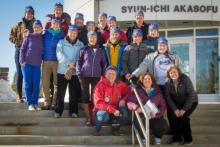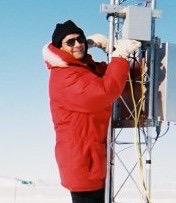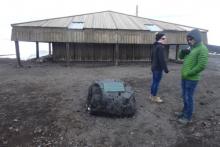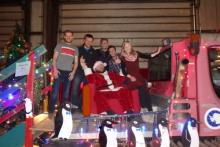Update
Now Archived! PolarConnect event with Mike Penn and Lee Welhouse from the South Pole Station in Antarctica on 17 December 2018. You can access this and other events on the PolarConnect Archives site.
What Are They Doing?
 Completed infrastructure of an AWS.
Completed infrastructure of an AWS.
The Antarctic Automatic Weather Station (AWS) network has been making meteorological observations since the early 1980s. This continent-wide network is positioned to observe significant meteorological events and increase our understanding of the climate of the Antarctic surface. Researchers utilize the AWS network to observe and learn about the Antarctic in a warming world. Given the duration of the AWS program and maintaining AWS sites for many years, numerous studies have been conducted on the surface climatology of regions of the continent, such as the Ross Ice Shelf. This climatology also aids in other studies, like winter warming events.
The Antarctic Automatic Weather Station network provides a greater understanding of the surface meteorology and climatology throughout the continent of Antarctica. The AWS network spans the Ross Ice Shelf, Ross Island, West Antarctica, East Antarctica, and the South Pole. Since some of the AWS have been working for over 30 years, we can begin to understand the climate over many regions of Antarctica.
Where Are They?
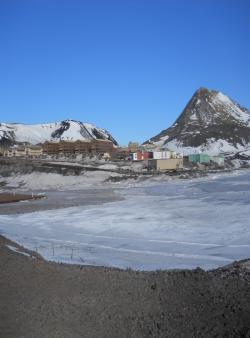 A view of McMurdo Station from Hut Point. Photo by Jacquelyn Hams.
A view of McMurdo Station from Hut Point. Photo by Jacquelyn Hams.
Based at McMurdo Station, Antarctica, the team will travel to remote locations. These locations may include the West Antarctic Ice Sheet (WAIS) and South Pole Station.
Latest Journals

Dr. Matthew A. Lazzara is an Associate Scientist and Research Meteorologist at the Antarctic Meteorological Research Center (AMRC), Space Science and Engineering Center (SSEC), University of Wisconsin–Madison (UW–Madison). He is presently the Principal Investigator of the Antarctic Automatic Weather Station Program. Dr. Lazzara is also a faculty member and Department Chair in the Department of Physical Sciences, School of Arts and Sciences, at Madison Area Technical College. There he teaches courses on weather & climate and climate & climate change. He’s research work focuses on observing the Antarctic from the surface and from satellites to gain an understanding of how Antarctic weather and climate behaves. Dr. Lazzara has deployed to Antarctica 10 times in the last 23 years.

